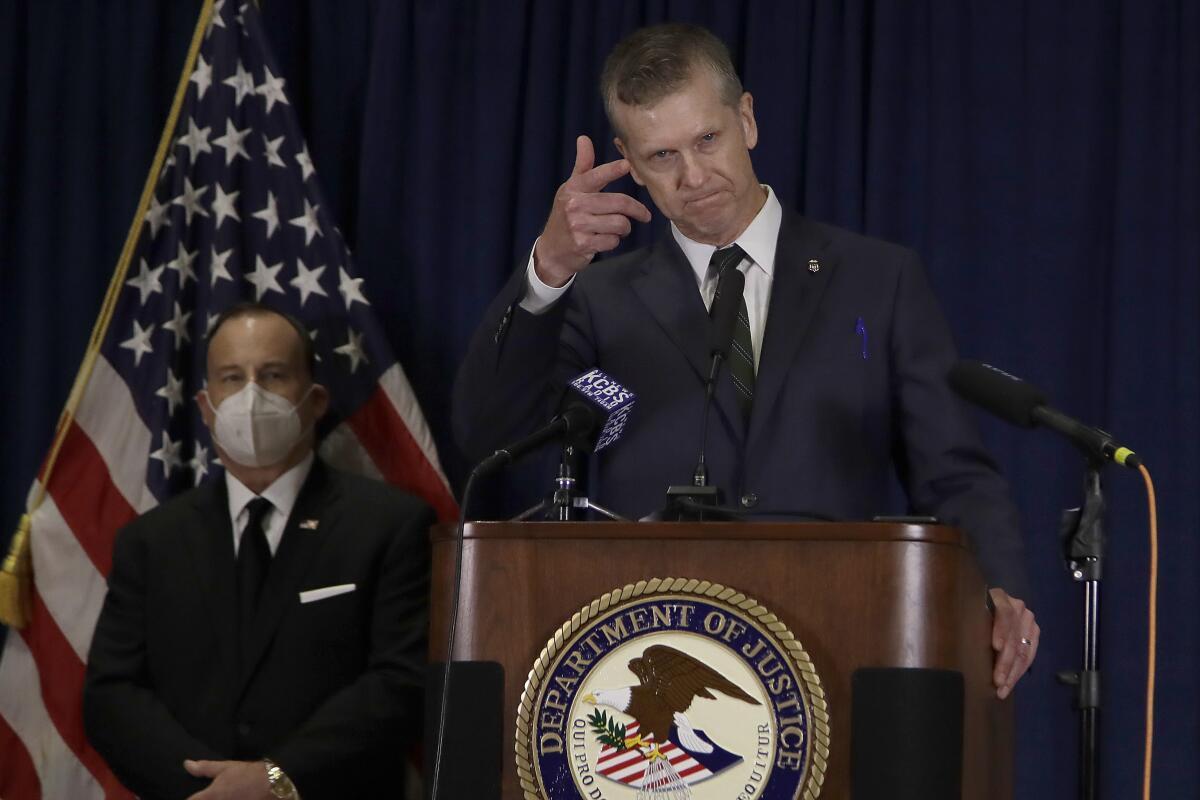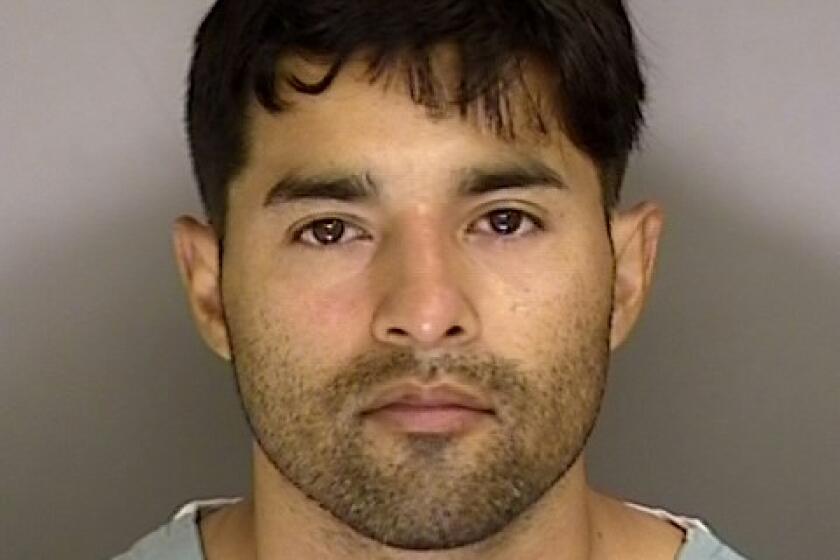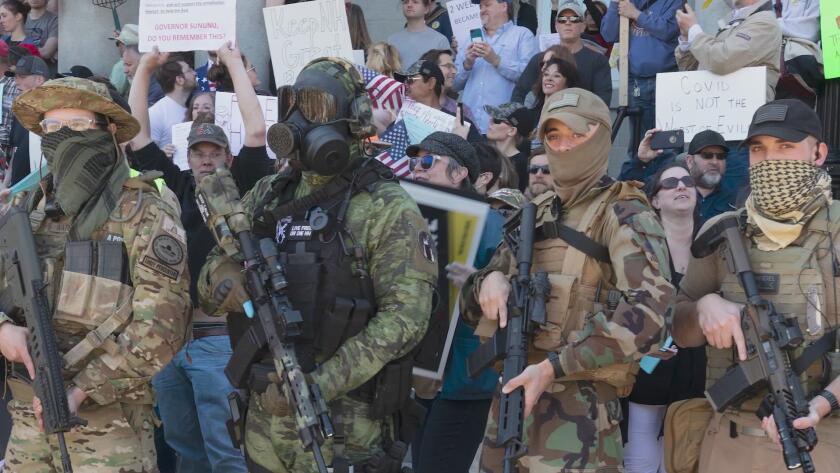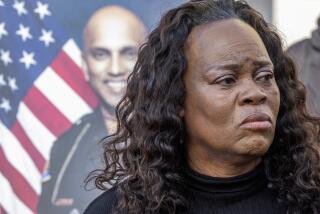Far-right ‘boogaloo boys’ linked to killing of California law officers and other violence

- Share via
In the wake of the killing of two law enforcement officers in Northern California, more attention is being directed to the “boogaloo” movement, a far-right fringe group that has been tied to violence around the country.
On Tuesday, federal law enforcement officials announced they were charging Air Force Sgt. Steven Carrillo, 32, and suspected accomplice Robert A. Justus Jr., 30, in the May 29 shooting death of a federal security officer in Oakland.
Carrillo also faces state charges in the June 6 killing of a Santa Cruz sheriff’s deputy.
What is boogaloo?
Brian Levin, executive director of the Center for the Study of Hate and Extremism at Cal State San Bernardino, says boogaloo followers include ultra-libertarians and white supremacists, but they all share a belief that a second civil war is coming.
“They are 2nd Amendment insurrectionists,” Levin said. “The boogaloo boys believe in armed insurrection and include attacks on the police.”
Other experts on extremists said the boogaloo movement was still evolving and its philosophy varied depending on geography and the underlying beliefs of individual members.
Although followers all want a second civil war to reset American society, experts say, their desired new society varies — some want to embrace racism, and others want to focus on armed libertarianism.
Many followers discovered the movement on internet chat sites. It then migrated to more mainstream social media, including Facebook and TikTok, where young adherents post videos of themselves dancing in their trademark Hawaiian shirts.
Air Force Sgt. Steven Carrillo, charged with the killing of a sheriff’s sergeant, now faces federal charges in the Oakland slaying of a federal officer.
How widespread is the movement?
Devin Burghart, executive director of the Institute for Research and Education on Human Rights, which tracks far-right extremist activity, said alt-right groups, including the boogaloo movement, increased their online presence dramatically when governments ordered shutdowns to protect people during the COVID-19 pandemic.
Adherents attended protests calling for businesses to reopen and later shifted to the demonstrations held following the police killing of George Floyd, he said.
Following President Trump’s call for “MAGA night” on Twitter after protesters demonstrated in front of the White House, Burghart said, he saw an uptick in alt-right participation in Floyd rallies.
“We only saw a handful of instances” before that, Burghart said. “We saw more boogaloo boys showing up at rallies with their Hawaiian shirts.”
Members of the New Mexico Civil Guard militia group, one of whom is accused of shooting a protester recently over the removal of a statue, also have ties to the boogaloo movement, he said.
“A number of boogaloo boys started in different elements of the far right,” Burghart said, “and have been drawn to the more confrontational stance of the boogaloo over time.”
Levin says the center’s research shows there have been 27 homicides connected to far-right extremists in the U.S. since 2019. That number doesn’t include the most recent Bay Area killings. The FBI arrested three devotees of the boogaloo movement in Nevada recently. They were charged with inciting violence with the use of Molotov cocktails at protests.
- Share via
Watch LA Times Today at 7 PM/10PM on channel 1 on Spectrum News 1, and on Cox systems in Palos Verdes and Orange County on channel 99.
What do we know about the California suspects?
When authorities searched Carrillo’s home, they found ammunition, firearms, bomb-making equipment, and a bullet-resistant vest with a curious patch.
The patch included an igloo and a Hawaiian-style print, markings associated with boogaloo.
Justus, the Millbrae, Calif., man who is Carrillo’s suspected accomplice, had social media posts showing support for boogaloo memes. One post reviewed by the Los Angeles Times names people who have been killed by law enforcement, including Oscar Grant, shot by transit police at Oakland’s Fruitvale station in 2009, and Vicki Weaver, wife of white supremacist Randy Weaver, who was killed by an FBI sniper during the 1992 Ruby Ridge siege in Idaho.
The federal government on Tuesday announced that it had charged Carrillo with the murder of federal security officer David Patrick Underwood, 53, a resident of the small East Bay city of Pinole, and the attempted murder of Underwood’s partner.
The security officers were shot while guarding a federal building in downtown Oakland during a Floyd protest. The pair used the protest as a cover for their plans to attack law enforcement, said FBI Special Agent in Charge Jack Bennett.
“There is no evidence that these men had any intention to join the demonstration in Oakland,” Bennett said at a Tuesday news conference. “They came to Oakland to kill cops.”
Federal officials said Justus was behind the wheel of a white van that carried Carrillo, who fired the shots. Surveillance video showed that Carrillo slid open the van’s side door to fire his weapon, officials said, as Justus acted at the getaway driver.
The two men were linked through cellphone records, officials said. Carrillo used a privately made, unmarked machine gun — a so-called ghost gun — with a silencer to kill Underwood, Bennett said. The federal complaint against Carrillo said law enforcement found similarities in fired cartridge cases at the shootings in both Oakland and Santa Cruz.
Evidence in the van led authorities to Carrillo’s Ben Lomond, Calif., home. There, in the early afternoon, Carrillo allegedly opened fire on deputies, killing Sgt. Damon Gutzwiller and injuring another deputy. An explosion then rocked the property, the Sheriff’s Office said.
Carrillo was shot during the gunfire, ran away and then hijacked a car on a nearby highway, according to the federal complaint against him. When he was arrested, he was bleeding from his hip.
Carrillo apparently used his own blood to write messages on the hood of the hijacked car, the complaint said. It identified the writing as “BOOG,” “I Became Unreasonable,” and “Stop the Duopoly.”
More to Read
Sign up for Essential California
The most important California stories and recommendations in your inbox every morning.
You may occasionally receive promotional content from the Los Angeles Times.















